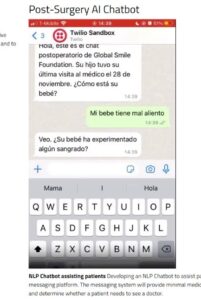In a collaborative effort to improve post-operative care for patients undergoing cleft lip/palate surgery, Global Smile Foundation (GSF), participated in the Massachusetts Institute of Technology (MIT) Code for Good Program during the Fall 2023 semester. Code for Good pairs student teams from MIT with local nonprofit organizations to help with technology-based solutions.
The MIT team worked on GSF’s efforts to leverage technology to improve patient care by developing a dynamic WhatsApp chat interface in Spanish. Post-operative care is a priority for any patient undergoing surgery, but GSF patients live in underserved areas and have limited access to health care. Using accessible technology is essential in providing timely follow-up care in this setting.

Working with GSF Advisory Board member, RG Conlee, the MIT team developed an interface on WhatsApp to provide essential support to patients undergoing post-operative treatment following cleft lip surgery. The platform provides basic medical advice to aid patients and caregivers in the recovery process after leaving the hospital. It also facilitates the sending of timely reminders and assists in determining whether a patient requires further medical attention.
“We’d like to thank GSF for this opportunity to further develop our skills through our collaboration and can’t wait to hear how they build on this prototype and deploy it in South America,” said Zach Marinov, team leader from MIT’s “Code for Good” program.
GSF President Dr. Usama Hamdan said, “We were so pleased to work with the MIT team from the ‘Code for Good’ program and are eager to see the platform in action with our patients during our March 2024 outreach medical program in Ecuador.”
GSF has published numerous articles on safe and effective recovery after surgery, the most recent one being Enhanced Recovery After Cleft Lip Repair: Protocol Development and Implementation in Outreach Settings. The implementation of an ERAS protocol (evidence-based protocols designed to standardize and optimize perioperative medical care) among patients undergoing cleft lip repair was shown to be highly effective in minimizing postoperative discomfort while reducing opioid use, decreasing the length of stay in the hospital, and leading to early oral feeding resumption. The ERAS principles can be safely applied in resource-constrained settings. This innovative approach underscores the potential of technology to address healthcare challenges and improve patient outcomes in outreach settings.
Reflecting on the collaboration, Conlee remarked, “Working with the MIT students on the Code for Good project was a positive experience. Seeing these young and talented students utilize their skills to assist the underserved populations supported by GSF was truly inspiring.”
Visit the Code for Good website for more information about the program and 2023 projects.
